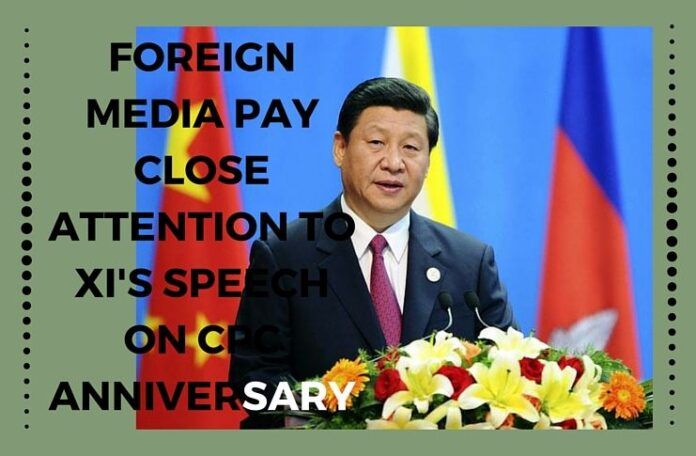
A wide range of foreign media have paid close attention to the speech of Chinese President, especially to the contents related to Marxism, anti-corruption and territorial sovereignty.
[dropcap color=”#008040″ boxed=”yes” boxed_radius=”8px” class=”” id=””]A[/dropcap] wide range of foreign media have paid close attention to the televised speech Chinese President Xi Jinping made upon the 95th founding anniversary of the Communist Party of China (CPC), especially to the contents related to Marxism, anti-corruption and territorial sovereignty.
The London-based Financial Times focused on Xi’s stress on the CPC’s continued devotion to Marxism by quoting his remarks of “The whole party should remember, what we are building is socialism with Chinese characteristics, not some other -ism,” in an article on its website on Friday.
The article, titled “Xi Jinping pledges return to Marxist roots for China’s Communists,” also noted China’s firm stance on maritime disputes and Xi’s warning against any threats to China’s security and Taiwanese independence.
The Associated Press seemed more interested in Xi’s appeal for ideological unity, quoting “Marxism must be the basic fundamental, guiding principle, or the party would lose its soul and direction,” in a report Friday.
The news agency said that the address demonstrated the Chinese leader attaches great importance to the reinforcement of ideological discipline and party rule.
Another key point picked up by foreign media’s reports was China’s anti-corruption campaign.
[dropcap color=”#008040″ boxed=”yes” boxed_radius=”8px” class=”” id=””]P[/dropcap]raising the progress of China’s anti-corruption drive in the past three years, Xi vowed in his speech to maintain a zero-tolerance stance regarding corruption.
Reuters pointed out in a report that Xi’s address emphasized the biggest threat to the ruling CPC is corruption, and called Xi’s campaign against graft “sweeping.”
Reuters also considered China’s claims on the South China Sea as “a muscular approach to protecting China’s sovereignty.”
Russia’s Interfax news agency said in its report that under Xi’s leadership, China has launched a far-reaching campaign against corruption within the ruling party, the government and the army in recent years, which has helped strengthen people’s confidence in the CPC and further promote the country’s reform.
Major media in Pakistan such as the Dawn, The News and Pakistan Observer, and those in Myanmar like Global New Light Of Myanmar and the Standard Time Daily, above all focused their attention on the CPC’s resolve to fight corruption.
Moreover, Xi’s attitude toward China’s maintaining national security has attracted a lot of attention from foreign media.
[dropcap color=”#008040″ boxed=”yes” boxed_radius=”8px” class=”” id=””]S[/dropcap]ingapore’s Lianhe Zaobao quoted Xi’s “Chinese people do not make trouble, but we are not cowards when involved in trouble,” commenting that it represents China’s response to the arbitration on the South China Sea started by the Philippines.
The article said that the way Xi stressed this on such a significant occasion indicated that China will stick to its own development path and is not afraid of any super power.
The AFP stated in a report Friday that Xi has won popularity with the anti-corruption campaign, which has involved several former top-ranked officials when referring to his words on party rule.
Major media in Romania also held similar views and pointed that “China will never compromise on sovereignty, says Xi Jinping.”
Notes: Xinhua- (This story has not been edited by PGurus.com and is generated from a syndicated feed we subscribe to)
- Pentagon cancels aid to Pakistan over record on militants - September 2, 2018
- The curious case of Tamil Nadu’s opposition to NEET - September 4, 2017
- If 2.6 Billion People Go To War: India vs. China - July 22, 2017










